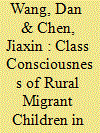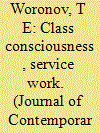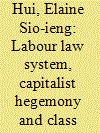|
|
|
Sort Order |
|
|
|
Items / Page
|
|
|
|
|
|
|
| Srl | Item |
| 1 |
ID:
181142


|
|
|
|
|
| Summary/Abstract |
The state of class consciousness of working-class children in China has received scant attention in the scholarly literature. This study examines the class consciousness of rural migrant children as they are about to join their migrant parents and become “China's new workers.” Qualitative investigations were conducted in two primary schools in Beijing. Focus group and individual interviews were held with 87 fifth- and sixth-grade migrant children in the two case schools and 324 valid student questionnaires were collected. The findings reveal that migrant children are aware of the unequal class relationships suffered by migrant workers; however, their interpretations of class-based injustices exhibit false consciousness, shadowed by individualism, meritocracy and the duality of images. Family and school may play vital roles in shaping migrant children's class consciousness.
|
|
|
|
|
|
|
|
|
|
|
|
|
|
|
|
| 2 |
ID:
114226


|
|
|
|
|
| Publication |
2012.
|
| Summary/Abstract |
This essay discusses an interesting paradox forming in urban China today. Using a Weberian framework, it argues that recent changes in state policy, educational structures, and forms of social status are producing new social classes. Yet at the same time, the very processes and policies that enable these new class formations also mitigate against the development of class consciousness. Based on a year of ethnographic research in two vocational secondary schools in Nanjing, this essay looks closely at the ways in which young people who are preparing to enter the lower echelons of the urban service economy are potentially part of a new social class, but one with very limited potential to develop class consciousness.
|
|
|
|
|
|
|
|
|
|
|
|
|
|
|
|
| 3 |
ID:
146516


|
|
|
|
|
| Summary/Abstract |
This article investigates how the Chinese labour law system has helped to reproduce capitalist hegemony, i.e. the ethico-political, moral and cultural leadership of the ruling class. Based on intensive fieldwork in the Pearl River Delta and 115 interviews with migrant workers, this article shows that the labour law system has exercised a double hegemonic effect with regards to capital–labour relations and state–labour relations. Through normalizing, countervailing, concealing and transmuting mechanisms, the labour law system has been able to buffer both the market economy and the party-state from workers’ radical and fundamental criticism. However, the double hegemony mediated through the labour law system has influenced the Chinese migrant workers in an uneven manner: some of them have granted active consent to the ruling class leadership; some have only rendered passive consent; and some have refused to give any consent at all.
|
|
|
|
|
|
|
|
|
|
|
|
|
|
|
|
| 4 |
ID:
144916


|
|
|
|
|
| Summary/Abstract |
Throughout the developing world, rapid urbanization is leading to new social relations and new conflicts between urban and (formerly) rural populations. This paper examines this process of change through a detailed examination of changing rural–urban relations in the town of Darjeeling, in the Himalayan foothills in Eastern India. In Darjeeling, increased rural mobility, accelerated rural-to-urban migration and the increased participation of rural people in local politics have led to major changes in the town. We demonstrate that the upward trajectory of rural classes who were previously subordinate is leading the more established urban residents to feel threatened, resulting in a redrawing of local political issues along rural–urban lines and a reconfiguration of class consciousness and social relations. The urban middle class, whose opportunities in the town have stagnated or declined, see rural migrants as a source of competition for increasingly scarce resources and blame them for the overall decline in the quality of urban life. They mobilize their (predominantly cultural) capital to reinforce markers of cultural distinction between them and the rural migrants and to delegitimize the political gains they have made. We argue that rural–urban conflict is emerging as the chief source of tension in the town and that this tension is largely grounded in class issues.
|
|
|
|
|
|
|
|
|
|
|
|
|
|
|
|
| 5 |
ID:
109154


|
|
|
|
|
| Publication |
2011.
|
| Summary/Abstract |
During the past thirty years in the social sciences, there has been a wide-ranging discussion of "class politics" in capitalist modernity. Several distinct threads have developed, largely in isolation from each other. The authors suggest that the various accounts implicitly rely on different definitions of class politics and propose a way to classify them. The classification is based on two questions: first, whether changes in the strength of the left depend on the working class specifically or on cross-class dynamics and, second, whether emergent class differences in politics are largely spontaneous or constructed. The authors use this classification to assess the prospects for testing the empirical implications of different accounts and point to the more general insights potentially offered by each approach.
|
|
|
|
|
|
|
|
|
|
|
|
|
|
|
|
|
|
|
|
|